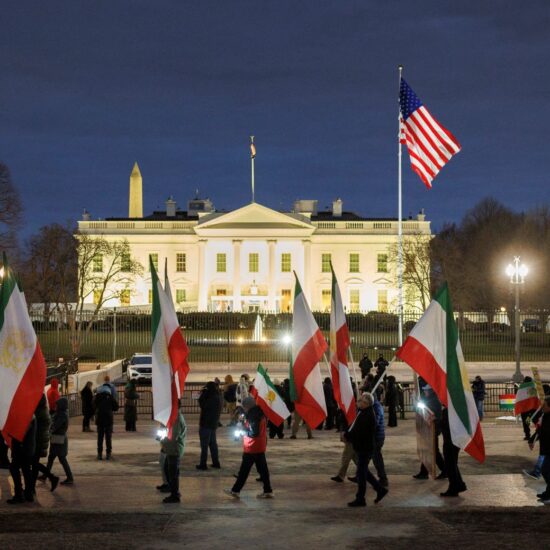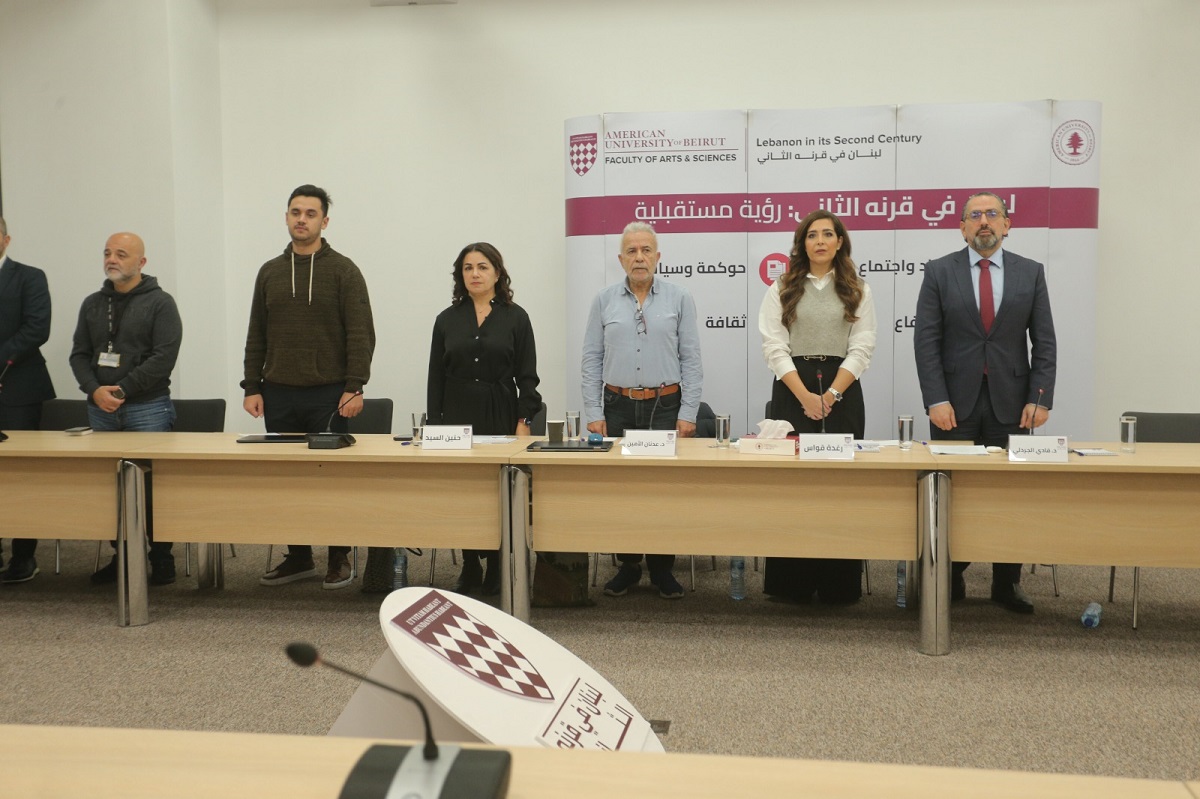
Lebanon, with an annual inflation of 84.9% in 2020 and a 90% devaluation of the Lebanese pound, has been identified by the World Bank as experiencing one of the three most severe economic crises globally since the mid-19th century. Currently, Lebanon is akin to a state near collapse, facing shortages in water, electricity, fuel, food, medication, and other essential life-saving services. The health and education sectors have been notably the hardest hit.
To address these pressing issues, the Faculty of Arts and Sciences, and the Department of History and Archaeology at the American University of Beirut organized a seminar titled “The Future of Lebanon: Can There Be a Future Without Health and Education?” This event is a part of the “Lebanon in its Second Century: A Vision for the Future” project, a series of panels launched last month and set to continue until March 2024. A summary of the past discussions is available.
The seminar featured distinguished speakers. For the educational sector, Dr. Adnan Al-Amin, Fellow at the Fares Institute at AUB, and Hanin El Sayed, Senior Researcher at Malcolm Kerr-Carnegie Middle East Center, were present. The health sector was represented by Joseph Otayek, Director of the Medical Center at the American University of Beirut, and Dr. Fadi El-Jardali, Director of the Policy Center at the same institution. The panel was moderated by Raghda Qawas, an expert in the educational and academic sector.
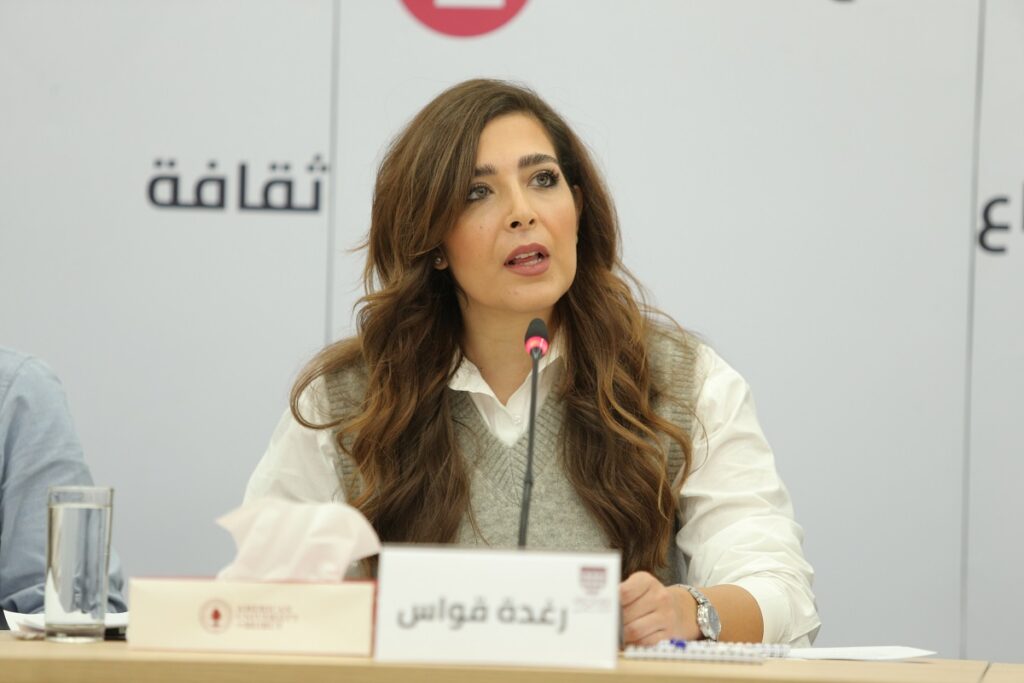
Raghda Qawas, an expert in the educational and academic sector.
In her opening statement, Qawas remarked, “Educational curricula in Lebanon have not evolved or adapted to align with the aspirations of the new generations and the significant technological and scientific developments worldwide.” She added that the deterioration in the local economic and political situations has led to a decline in academic, scientific, and educational standards in Lebanese universities, official schools, and secondary institutions, including the private sector.
Qawas highlighted a World Bank projection from 2021 in the Human Capital Index, which stated that Lebanese students, despite spending almost ten years in education, achieve effective learning equivalent to about six and a quarter years. This places Lebanon below the Middle East average. She also emphasized that the health sector suffered similarly due to shortages of human and financial resources, negatively impacting scientific research.
“Rescue policies for the education and health sectors in Lebanon have not yielded results for several reasons, including the absence of proper policies, implementation mechanisms, and public corruption,” Qawas stated.
The Educational Sector
The first session of the panel, focusing on the educational sector, featured a presentation by Dr. Adnan Al-Amin. He outlined the general features of educational policies from independence to post-2019, including transformations after the Taif Agreement, and discussed the prospects for change. Al-Amin said, “Planning for the future is challenging if stakeholders do not have the ability to control influential factors, such as history and geography.” He added, “Therefore, discussing educational reform sometimes seems like idle chat. However, there are other ‘cumulative or achieved’ factors that can be leveraged for future change, such as the vitality and strength of society, educational resources, freedom of expression and academic freedom, and forces of change. The diaspora should not be left outside of this narrative.”
Al Amin recommended introducing a new corporate governance mechanism for educational institutions and creating a global framework for pluralism. He believes that the establishment of research hubs in arts and sciences will be key to Lebanon’s new competitive arena. “This is the core of Lebanon’s competitiveness in the field,” he added.
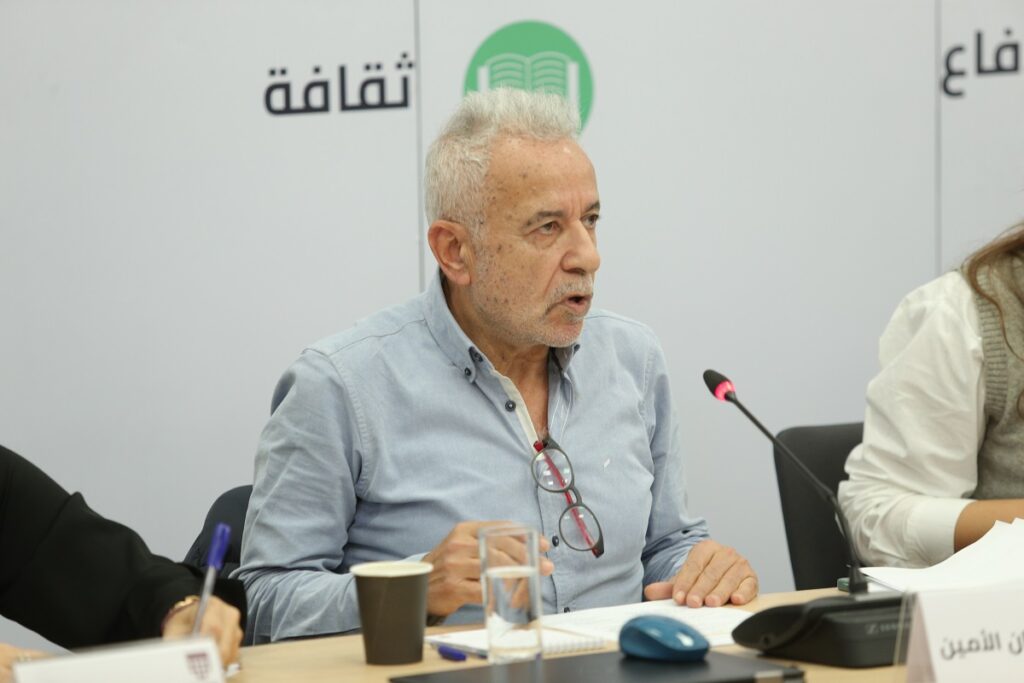
Dr. Adnan Al-Amin, Fellow at the Fares Institute at AUB
Haneen Al-Sayyed, a prominent researcher at the Malcolm H. Kerr Carnegie Middle East Center, highlighted structural issues in regional education systems, including Lebanon’s. She stated, “many countries in the region, including Lebanon, adopted the structural approach in building schools and appointing teachers which did not lead for effective competitiveness or change”. Al-Sayyed added, “This resulted in a lack for incentives and accountability for members of the educational sector, resulting in a stagnant status quo in the sector.” She also noted, “Many countries adopt the independence approach for schools, whether in education, finance, or dealing with the community. In Lebanon, the private sector is somewhat independent in its planning of the education life and endowed with good experiences that government-led curricula can benefit from.”
Emphasizing the need for reform, Al Sayyed said, “there is a need for the government to lay down a decentralized or independent approach for official schools, benefiting from the experiences of private schools. A relationship can be developed along these lines and a sound partnership for mutual experience sharing and assistance.”
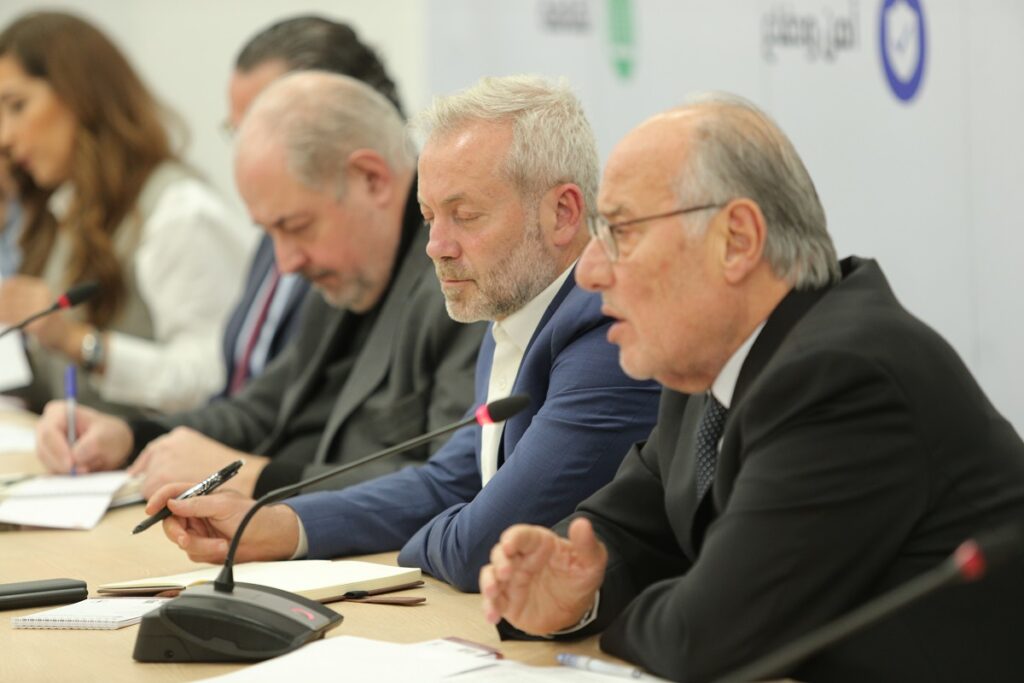
Abbas Al-Halabi, Minister of Education
Education Minister Abbas Al-Halabi also spoke, highlighting the multiple crises affecting Lebanon’s education and health sectors. He said, “Lebanon paid a very high price due to the crisis that hit both the education and health sectors,” noting the additional challenges brought by the COVID-19 pandemic, social unrest, economic crisis, and the Beirut blast on August 4, 2020. Al-Halabi pointed out a significant consequence of the economic crisis: the rise in tuition costs at private universities, payable in dollars, forcing many students to either drop out or transfer to the Lebanese University, which suffers from major budgetary, academic, and logistical problems. He mentioned that the public school system is overburdened and underfunded, with around 55,000 students moving from private to public schools in 2020-2021, as reported by the World Bank in 2021. Al-Halabi noted the teacher-student ratios in public and private schooling, as well as the enrollment of Syrian students in the Lebanese education system.
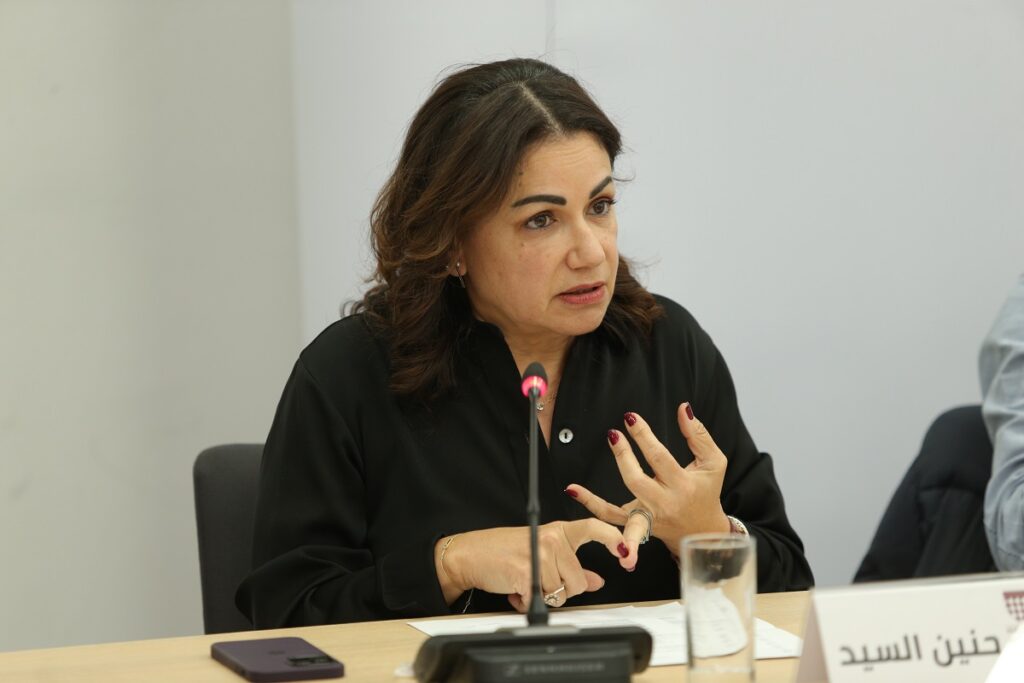
Haneen Al-Sayyed, a prominent researcher at the Malcolm H. Kerr Carnegie Middle East Center
Al-Halabi stated that “the educational scene in Lebanon is not in a state of complete collapse, but lacks a legislative effort in keeping pace with the development of the education sector.” He disclosed that his administration has developed a structure for the General Directorate of Higher Education, which had been lacking for years. He lamented the decline in student numbers at Lebanese University and official schools, saying, “the situation cannot remain as it is.” Regarding curriculum development, Al-Halabi announced the launch of a program for secondary education after a 25-year absence.
The Health Sector
The second session of the seminar shifted its focus to the healthcare sector. As of February 2019, the Bloomberg Healthcare Efficiency Index had ranked Lebanon 23rd globally in healthcare efficiency. However, the healthcare system has significantly deteriorated since then. The minimum wage plummeted from US$ 585 to US$ 43 in 2021, and there has been a substantial emigration of healthcare workers, adversely affecting the system. Nurses, for instance, now earn an average salary of US$ 75 for a 40-hour work week. Many have been compelled to accept unfair salary cuts or work without pay, while the more highly educated and experienced are emigrating in search of better opportunities.
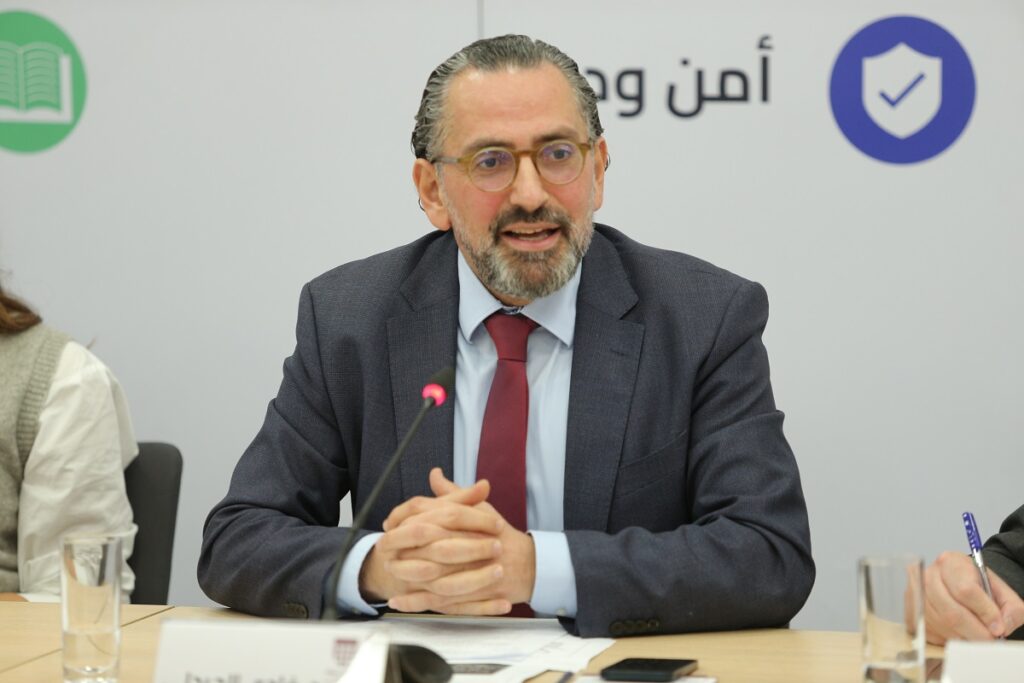
Dr. Fadi Jardali, Director of the Policy Research Institute at the American University
Dr. Joseph Otayek, Director of the Medical Center at the American University of Beirut, presented “Lebanon’s Healthcare Sector During the Crisis: Unshakable Trust.” He observed that Lebanon’s healthcare sector’s approach during the economic crisis was unique, managing to maintain patient trust and service quality. He mentioned that hospitals and insurance companies had agreed to significant price reductions to continue providing services. Suppliers imported goods with the Central Bank’s support, despite risks of delayed payments. Despite facing substantial income reductions, healthcare professionals continued to treat patients with humanity and compassion.
Lebanese hospitals are struggling financially due to challenges in accessing foreign currency, difficulties in receiving payments from insurance companies, reduced government funding, and uneven distribution of available funds. The economic crisis has also diminished patients’ ability to pay for medical care. Despite these challenges, Dr. Otayek noted that the American University of Beirut Medical Center and the broader healthcare sector in Lebanon managed to maintain their patients’ trust. He highlighted that the quality of care remained excellent and affordable, even as hundreds of doctors left the country, leading to service limitations in specialized units such as pediatric cardiac critical care, fetal medicine, and brachytherapy, affecting patient care and training for future healthcare workers. However, he noted that many healthcare professionals who had left during the crisis were beginning to return.
Dr. Fadi Jardali, Director of the Policy Research Institute at the American University, pointed out that before the 2019 crisis, citizens paid between 35 and 37 percent for healthcare services, but this figure has now risen to 85 percent. This is despite the existence of guarantee funds, solidarity funds, insurance companies, and longstanding promises to invest in public healthcare for comprehensive coverage. He noted that less than six percent of budgets are allocated to healthcare, with the majority going towards beds and hospitals. Jardali concluded by emphasizing that reforming the healthcare sector is not an isolated task but part of broader necessary reforms.
The article then poses the question, “Where do we go from here?” It highlights the issue of Lebanon’s highly privatized healthcare and education system, which offers inequitable services accessible only to those who can afford them. The need for more inclusive, equitable, and accountable education and healthcare systems is evident. Both sectors face the challenge of transforming to meet common goals in Lebanon, including a roadmap for cooperation between private and public sectors. This transformation is crucial for addressing the compounded crises caused by regional conflicts, widespread poverty, and domestic issues impacting the Lebanese economy. The advancement and transformation of both the healthcare and education systems are deemed crucial for Lebanon’s future.
Maan Barazy is an economist and founder and president of the National Council of Entrepreneurship and Innovation. He tweets @maanbarazy.
The views in this story reflect those of the author alone and do not necessarily reflect the beliefs of NOW.




